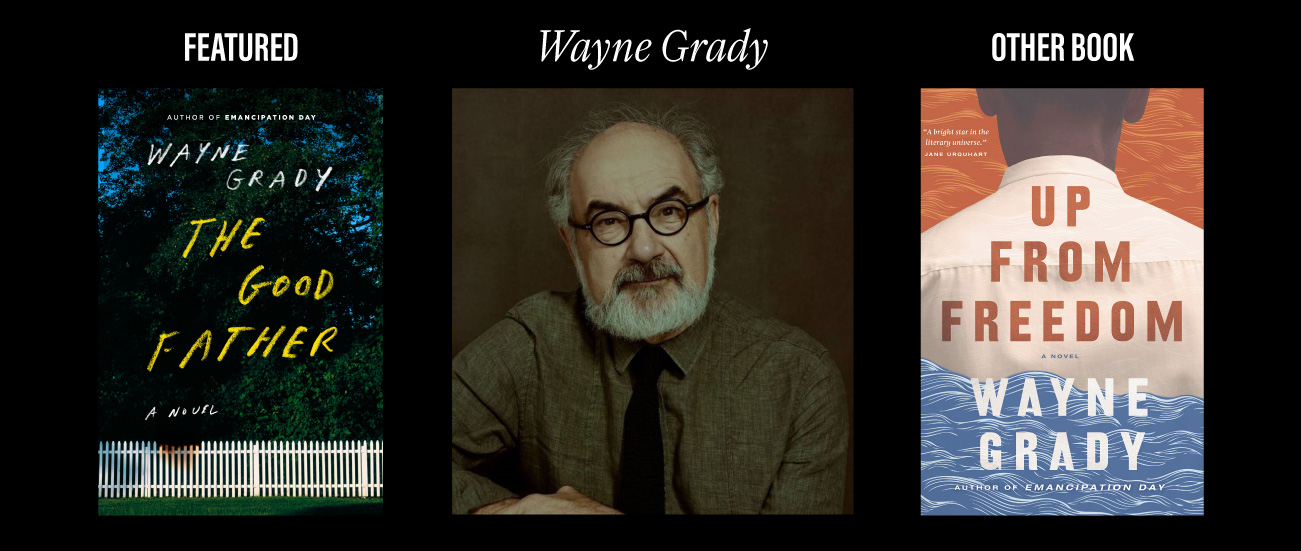
Wayne Grady’s Featured Book
The Good Father
From bestselling author Wayne Grady comes The Good Father, his first contemporary novel, which comically and tragically reckons with a father and daughter’s estrangement, the failures brought on by hubris, the limits of perception and the price we pay for second chances.
Every story has two sides, two perspectives. And when it comes to a relationship between a daughter and her father, separated first by divorce and then by both generational gaps and physical and emotional distance, those perspectives can colossally diverge.
Such is the case with Harry Bowes and his only daughter, Daphne. Harry is a mild mannered journalist turned teacher turned wine merchant who is content to putter around his home in Toronto eating things straight out of the fridge that both his doctor and his second wife, Elinor, would disapprove of, and procrastinate calling his daughter even though he senses something is amiss. Meanwhile, in Vancouver, Daphne seems intent on a course of nihilism, having gone from being a loving girl to a top student to a hostile young woman who is determined to destroy her life and relationships by self-medicating with drugs and alcohol. When a catastrophic event wrenches them out of their states, one of stasis and one of chaos, Harry and Daphne are forced to examine the ways in which their self-absorption has eroded their connection and discover whether a family’s bond is truly ironclad or if their damage is irreparable.
Told in alternating perspectives, The Good Father delivers a deeply satisfying and layered novel of love, perception, family, and domesticity.
Buy the Book:
Owl’s Nest Books | Shelf Life Books
Borrow the Book from the Library:
Calgary Public Library
Wayne Grady’s Other Book
Up From Freedom
For readers of Colson Whitehead, James McBride, Yaa Gyasi and Lawrence Hill, Up From Freedom is a powerful and emotional novel about the dangers that arise when we stay silent in the face of prejudice or are complicit in its development.
As a young man, Virgil Moody vowed he would never be like his father, he would never own slaves. When he moves from his father’s plantation in Savannah to New Orleans, he takes with him Annie, a tiny woman with sharp eyes and a sharper tongue, who he is sure would not survive life on the plantation. She’ll be much safer with him, away from his father’s cruelty. And when he discovers Annie’s pregnancy, already a few months along, he is all the more certain that he made the right decision.
As the years pass, the divide between Moody’s assumptions and Annie’s reality widens ever further. Moody even comes to think of Annie as his wife and Lucas as their son. Of course, they are not. As Annie reminds him, in moments of anger, she and Moody will never be equal. She and her son are enslaved. When their “family” breaks apart in the most brutal and tragic way, and Lucas flees the only life he’s ever known, Moody must ask himself whether he has become the man he never wanted to be — but is he willing to hear the answer?
Stretching from the war-torn banks of the Rio Brazos in Texas to the muddy waters of Freedom, Indiana, Moody travels through a country on the brink of civil war, relentlessly searching for Lucas and slowly reconciling his past sins with his hopes for the future. When he meets Tamsey, a former slave, and her family trying to escape the reach of the Fugitive Slave Act, Moody sees an opportunity for redemption. But the world is on the cusp of momentous change, and though some things may be forgotten, nothing is ever really forgiven.
Buy the Book:
Owl’s Nest Books | Shelf Life Books
Borrow the Book from the Library:
Calgary Public Library
